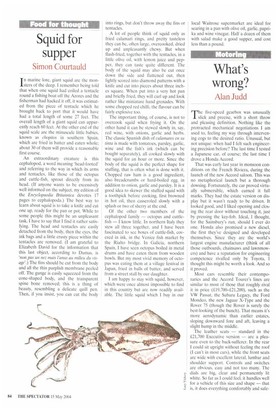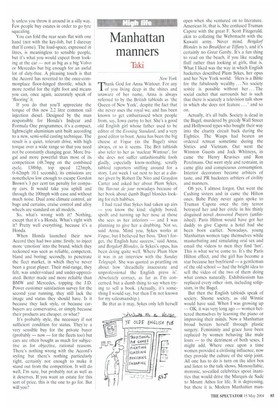What's wrong?
Alan Judd
The five-speed gearbox was unusually slick and precise, with a short throw and pleasing definition. Nothing like the protracted mechanical negotiations I am used to, feeling my way through intervening cogs to the desired ratio. Unusual, but not unique: when had I felt such engineering precision before? The last time I tested a Japanese car, of course; the last time I drove a Honda Accord.
That was early last year in monsoon conditions on the French Riviera, during the launch of the new Accord saloon. This was no metaphorical launch but a thorough dowsing. Fortunately, the car proved virtually submersible, which earned it full marks. They had the estate version on display but it wasn't ready to be driven. It looked good, and I liked opening and closing the rear door without touching it, just by pressing the key-fob. Ideal, I thought, for the Sainsbury's run, should I ever do one. Honda also promised a new diesel, the first they've designed and developed themselves. Since they are the world's largest engine manufacturer (think of all those outboards, chainsaws and lawnmowers) and have a reputation for engineering competence rivalled only by Toyota, I thought this might be worth a look. And so it proved.
Most cars resemble their contemporaries and the Accord Tourer's lines are similar to most of those that roughly rival it in price (£19,700–£21,200), such as the VW Passat, the Subaru Legacy, the Ford Monde°, the new Jaguar X-Type and the Rover 75 (though the Rover is surely the best-looking of the bunch). That means it's more aerodynamic than earlier estates, sloping downward fore and aft, leaving a slight hump in the middle.
The leather seats — standard in the £21,700 Executive version — are a pleasure even to the back-sufferer. In the rear I could sit upright without feeling the roof (I can't in most cars), while the front seats are wide with excellent lateral, lumbar and shoulder support. Controls and switches are obvious, easy and not too many. The dials are big, clear and permanently lit white. So far as I could feel, it handles well for a vehicle of this size and shape — that is, it does everything comfortably and safe 5. ly unless you throw it around in a silly way. Few people buy estates in order to go tyre squealing.
You can fold the rear seats flat with one hand (not with the key-fob, but I daresay that'll come). The load-space, expressed in litres, is meaningless to sensible people, but it's what you would expect from looking at the car — not as big as a big Volvo or Mercedes but big enough for an awful lot of duty-free. A pleasing touch is that the Accord has reverted to the once-commonplace floor-hinged throttle, which is more restful for the right foot and means you can, once again, accurately speak of 'flooring' it.
If you do that you'll appreciate the torque of this new 2.2 litre common rail injection diesel. Designed by the man responsible for Honda's Indycar and Formula One programmes, it's a compact, lightweight aluminium unit built according to a new, semi-solid casting technique. The result is a quiet, tolerant drive, with high torque over a wide range so that you need not be constantly changing gear. More frugal and more powerful than most of its competition (48.7mpg on the combined cycle, 138bhp, top speed 123mph, 0-62mph 10.1 seconds), its emissions are nonetheless low enough to escape Gordon Brown's 3 per cent tax penalty for company cars. It would take you uphill and through the 100mph with ease and without much noise. Dual zone climate control, air bags and curtains, cruise control and alloy wheels are standard on all models.
So, what's wrong with it? Nothing, except that it's a Honda. What's right with it? Pretty well everything, because it's a Honda.
When Honda launched their new Accord they had two aims: firstly, to inject more 'emotion' into the brand, which they reckoned was seen as reliable, competent, bland and boring; secondly, to penetrate the fleet market, in which they've never been a great player. Their mid-range, they felt, was under-valued and under-appreciated. Better made and more reliable than BMW and Mercedes, topping the J.D. Power customer satisfaction survey for the second year running, they still lack the image and status they should have. Is it because they lack style, or because carbuyers are conservative, or simply because their products are cheaper, or what?
It's probably style, the necessary if not sufficient condition for status. They're a very sensible buy for the private buyer (probably — now — for the fleets too) but cars are often bought as much for subjective as for objective, rational reasons. There's nothing wrong with the Accord's styling but there's nothing particularly right, certainly not enough to make it stand out from the competition. It will do well, I'm sure, but probably not as well as it deserves. If you want an estate for this sort of price, this is the one to go for. But will you?



































































































 Previous page
Previous page